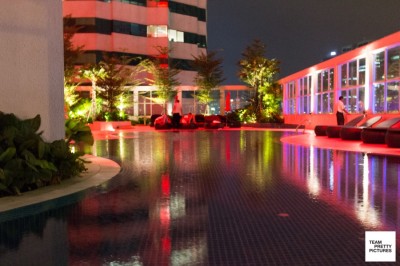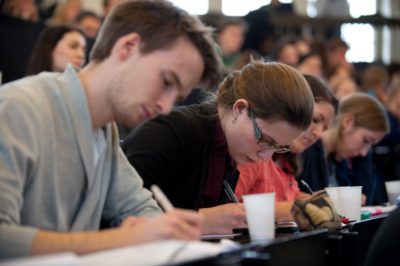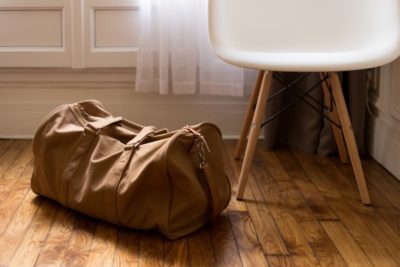Why WUDC is different
Is it your first time at the World University Debating Championship? Don’t worry – Melanie Sindelar has written down what experiences might await you.

WUDC in Malysia 2014 – © Matthias Carcasona
Attending Worlds is an experience like no other. There is so much to learn from each debate, so much excitement from travelling to a new place, and above all: so many new friends to meet. I myself have made many friends from different corners of the world despite not being the most forthcoming person in a competitive setting. Jokes aside: even as you pace back and forth, anxiously awaiting the results of the round there will always be a friendly spirit up for a chat.
I’m writing this article for all of those attending this year’s Dutch WUDC, regretting that I myself won’t be there. Yet, whether you are a frequent visitor to the World Championships or attending for the first time, I’d like to give a heads up about a few aspects in which WUDC is unlike any other competition. First, the basics.
The Worlds spirit
At WUDC you won’t meet people from only your continent, but from all around the world. There are two things that are important to note:
First, be aware of your position, and your own privileges. Living in a privileged (read: democratic) setting blinds us to the structural disadvantages others face. At WUDC, motions are set so that you will have to reconsider your received ideas about politics, ethics, religion, and so on – a certain openness is required in such circumstances. Secondly, however, given you face debaters from many different countries, you cannot speak of your local politician assuming everyone is informed. If you want debaters to respond to your arguments and examples, then these will need to be contextualised.

Judges at work – © Felix Schledding
Judging
Judges are just as diverse as teams. Recognize that not everyone practices British Parliamentary year-round, yet all of us congregate to compete in this format for about one week per year. Judges of course will do their best to adhere to the format, but each judge – aside from their own individual preferences – is shaped by the norms and standards of their own region. Therefore, you need to be all the more crystal clear in your argumentation, and as we know, that includes not only your argument, but justifications and imperatives for your choice of argument as well.
It is also crucial to make yourself familiar with the speaking scale – as judges who come from non-BP contexts will definitely use them (and I hope, those from BP contexts too). Don’t forget that WUDC is stressful for judges as well. They want to give their best just as much – make their job an easy one.
If indeed you get a call with which you do not agree, be pleasant when further inquiring with the judge. There is no need for petty aggression – if the judge didn’t “understand” your argument, it was because you weren’t clear enough. Be fair to other teams, do not intimidate them, and do not try to intimidate judges. It never goes down well.
Preparation
Time is short until Dutch WUDC, yet there are a few things you could do in advance. I assume all of you have been preparing your very best, including tending to your own weaknesses, honing your strategic thinking, and reading up on current affairs. But aside from those, and given the short time, there are two more pieces of advice I’d like to give.
Firstly, take the time to think of the systematic problems you face in each of the positions you speak. Let us assume you’re Prime Minister and you are often unstructured in these speeches (ouch!), then it makes sense to write down the basic structure of a PM speech according to the debate’s character (policy, analysis, IR), and take them with you. At WUDC, I can assure you, there is no time to think of the basics in prep time: they must be quickly at hand.
Secondly, it is immensely helpful to have an up-to-date factbook with you, in case you yourself aren’t so much up to date on world politics. For German speakers in particular, I recommend the Fischer Weltalmanach (it saved me on the Venezuelan debate at this year’s EUDC, and that although Madlen [Melanie’s team partner, editor’s note] and I were CG).
Thirdly, there is the issue of casefiles. Now, opinions are divided on this matter – some find them immensely useful, others disregard them. I have – in the past – broken my back with too many casefiles, and they have not proven to be an automatic life-saver. So, if you do use casefiles, do yourself the favour and prepare them cleverly. Instead of carrying with you a bunch of unsorted newspaper articles (which do not even qualify properly as matter-files, if you ask me), prepare motions diligently. Prep each side, each case, come up with arguments. The minimalists amongst you should at least have a peek at the CA team’s latest motions they have set at other tournaments. This gives you at least some advantage against more experienced teams who had the time to observe the inclinations of both CAs and other judges at past competitions. Also, it is helpful to think of motions yourself. What if you were a Worlds CA? Which motions do you think would come up? This can also help in making you feel prepared.
Lastly – know your host country. This means your knowledge about the Netherlands needs to supercede the legalisation of weed, their talents in cheese-production, and the country’s necessity of dams; you need to know the country’s politics, know its leaders, understand the problems the country currently faces. It never harms to know their relation to the EU and other international bodies (oh wait, isn’t the ICC’s seat in Den Haag!?), and some of its colonial history.

Source: pixabay.com
What to pack
I am sure you can check the weather forecast all by yourself. In my experience, it’s less the wrong choices of clothes that will bother you at the competition, and more the little essentials you have forgotten to take with you. I have, during the course of my debate life, forgotten hair-brushes, and even toothbrushes, socks, umbrellas, or cigarettes. In sum: pack the things that keep you sane.
Then of course, also pack what you need as a debater: paper, pens, a book or hard surface on which you can write (should there be no tables). It also is necessary to pack medication – even if you might not get sick, your debate partner or friends will, and it’s always good to have the basics on you. Last of all, take some muesli bars with you. WUDC is even bigger than the regional championships, making it prone to logistical problems. From what I have seen at Dutch competitions, I am convinced you are in good hands, but always be prepared for delayed food deliveries. Make sure you get the nutrition you need.
Socials
First of all, enjoy them of course. Worlds is more than just a competition, it is a place in which you meet old friends and make new ones. Drink responsibly, not only for your own sake, but also for those of others. It is absolutely essential to recognize that the Equity guide [available soon, editor’s note] (which, needless to say, everyone not only should, but needs to read and comply with) is in effect during the whole tournament, including socials and other events.
Lastly, there is the all-feared break night. Whether or not you break, make sure to enjoy the evening – it is the start of a new year in your life, and that life, as we all come to realize sooner or later, is bigger than debating alone. Best of luck to all of you, and have a splending Dutch WUDC 2017!
Melanie Sindelar/lok.
Melanie Sindelar is a long-term member of Debattierklub Wien, and in her current function serves as the President as well as the Director of Debates. She won the ESL final of the Cambridge Women’s and was an ESL finalist at the IV too. Besides being a finalist and semi-finalist across competitions in Europe, she has recently taken a liking to CA-ships, including the UCL IV, Riga Technical Open, and Copenhagen Open. She attended Berlin WUDC, Malaysia WUDC, and Thessaloniki WUDC. If not debating, Melanie is occupied with her PhD at the University of Vienna. As a true Viennese, she is often found in Viennese coffee houses.





